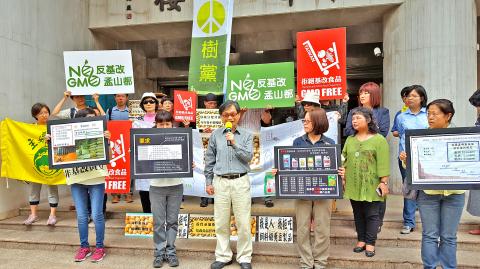Consumer groups yesterday protested against the use of genetically modified (GM) soybeans as human food, saying less than 3 percent of soybeans on the market are natural and urging the government to ban GM food for human consumption to prevent potential health risks.
The protest in front of the Legislative Yuan was part of the March Against Monsanto, an international movement against the multinational producer of GM seeds and glyphosate-based herbicide.
Members of the Homemakers United Foundation performed a skit showing how GM crops produced by Monsanto could withstand herbicides the company manufactured, while other “natural” plants and weeds withered when exposed to the herbicides.

Photo: Chen Wei-han, Taipei Times
“Nearly 98 percent of Taiwan’s soybean imports are GM products according to Food and Drug Administration statistics. However, Japan, which is also a leading soybean importer, prohibits GM beans from being used as human food. The government should learn from Japan and limit the use of GM soybeans to protect public health,” Democratic Progressive Party (DPP) Legislator Frida Tsai (蔡培慧) said.
The incidence of food allergies in children has increased from 8 percent 20 years ago to 50 percent today, which has been associated with the consumption of GM food products, Chang Gung University toxicology professor Lin Chung-yin (林中英) said.
Many food additives, such as syrup and thickening agents, are made with GM organisms, so it is highly recommended that the government ban GM products as human food, Lin said.
National Taiwan University agronomy professor Warren Kuo (郭華仁) said most imported soybeans are not food-grade beans, but a mixture of feed-grade beans and beans used to produce oil, all of which are genetically modified and fed to the public.
“People do not know they are eating feed-grade beans because of the lack of mandatory labeling laws on such beans. Feed-grade GM beans contain lower protein content, but are high in glyphosate, a widely used herbicide that is possibly carcinogenic,” Kuo said.
The nation requires feed-grade corns, but not feed-grade soybeans, to be labeled, Kuo said, calling for the mandatory labeling of beans.
The maximum residue limit for glyphosate in soybeans is 10 part per million (ppm), which is 100 times higher than the glyphosate limit for rice at 0.1ppm.
“The glyphosate limit for soybean is set based on the American and European standards at 20ppm, but soybean is a staple food in Taiwan, so the limit should be substantially lowered,” Kuo said.
A recent US trade report took Taiwan’s mandatory labeling of GM food products and a ban on GM products from school lunches as a trade barrier, and the government might yield to US pressure in future negotiations, so the public must stand more firmly against GM organisms, DPP Legislator Lin Shu-fen (林淑芬) said.

A Taiwanese software developer has created a generative artificial intelligence (AI) model to help people use AI without exposing sensitive data, project head Huang Chung-hsiao (黃崇校) said yesterday. Huang, a 55-year-old coder leading a US-based team, said that concerns over data privacy and security in popular generative AIs such as ChatGPT and DeepSeek motivated him to develop a personal AI assistant named “Mei.” One of the biggest security flaws with cloud-based algorithms is that users are required to hand over personal information to access the service, giving developers the opportunity to mine user data, he said. For this reason, many government agencies and

The National Fire Agency on Thursday said a series of drills simulating a magnitude 8.5 earthquake would be held in September to enhance the government’s emergency response capabilities. Since earthquakes cannot be predicted, only by continuously promoting disaster prevention measures could Taiwan enhance its resilience to earthquakes, agency Director-General Hsiao Huan-chang (蕭煥章) said in a news release. The exercises would be held to mark annual National Disaster Prevention Day on Sept. 21, the aim of which is to test Taiwan’s preparedness and improve its earthquake resilience in case of a major temblor, Hsiao said. As part of those drills, an earthquake alert would

DEFENSE: The National Security Bureau promised to expand communication and intelligence cooperation with global partners and enhance its strategic analytical skills China has not only increased military exercises and “gray zone” tactics against Taiwan this year, but also continues to recruit military personnel for espionage, the National Security Bureau (NSB) said yesterday in a report to the Legislative Yuan. The bureau submitted the report ahead of NSB Director-General Tsai Ming-yen’s (蔡明彥) appearance before the Foreign and National Defense Committee today. Last year, the Chinese People’s Liberation Army (PLA) conducted “Joint Sword-2024A and B” military exercises targeting Taiwan and carried out 40 combat readiness patrols, the bureau said. In addition, Chinese military aircraft entered Taiwan’s airspace 3,070 times last year, up about

STRICTER ENFORCEMENT: Taipei authorities warned against drunk cycling after a sharp rise in riding under the influence, urging greater public awareness of its illegality Taipei authorities have issued a public warning urging people not to ride bicycles after consuming alcohol, following a sharp rise in riding under the influence (DUI) cases involving bicycles. Five hundred and seven people were charged with DUI last year while riding YouBikes, personal bicycles, or other self-propelled two-wheelers — a fourfold increase from the previous year, data released by the Taipei Police Department’s Traffic Division showed. Of these, 33 cases were considered severe enough to be prosecuted under “offenses against public safety,” the data showed. Under the Road Traffic Management and Penalty Act (道路交通管理處罰條例), bicycles — including YouBikes and other